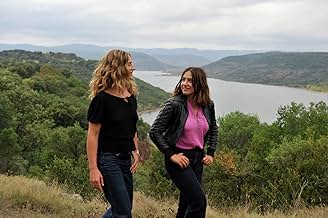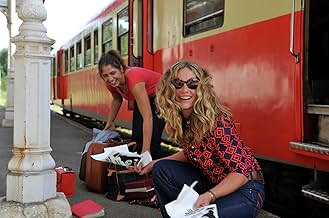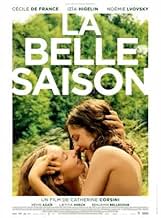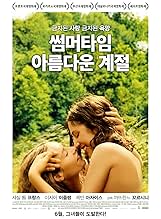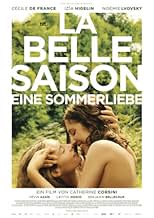La belle saison
- 2015
- Tous publics
- 1h 45min
NOTE IMDb
6,7/10
6 k
MA NOTE
Delphine, fille de paysans, monte à Paris pour s'émanciper du carcan familial et gagner son indépendance financière. Carole est parisienne. Lorsque Delphine et Carole se rencontrent, leur hi... Tout lireDelphine, fille de paysans, monte à Paris pour s'émanciper du carcan familial et gagner son indépendance financière. Carole est parisienne. Lorsque Delphine et Carole se rencontrent, leur histoire d'amour fait basculer leurs vies.Delphine, fille de paysans, monte à Paris pour s'émanciper du carcan familial et gagner son indépendance financière. Carole est parisienne. Lorsque Delphine et Carole se rencontrent, leur histoire d'amour fait basculer leurs vies.
- Réalisation
- Scénario
- Casting principal
- Récompenses
- 3 victoires et 8 nominations au total
Cécile de France
- Carole
- (as Cécile De France)
Natalie Beder
- Marie-Laure
- (as Nathalie Beder)
Nathalie Lovigui
- Une militante MLF dans l'amphi
- (as Nathalie Lovighi)
Avis à la une
LGBT rights are more relevant than ever. In several countries, unfortunately, the trend is towards more difficult living conditions for gays and transgender people. Seen in such a perspective, the plot of this film remains relevant, despite the fact that it depicts a summer in 1971.
Although perhaps the problem here is something we have seen in many films, the film is experienced as both engaging and well told.
I sat thinking when I saw this movie; how many such fates exist? Both before and now? That people cannot live their lives to the fullest, in fear of condemnation from their surroundings. There are probably a lot of them, and in that way such films become important and unfortunately relevant. For such films we need. We need to be reminded of how the world treats and views queer people. In addition to a strong and pointed action, the film is also beautifully filmed, well directed and with good actors who get both convincing and engaging.
It's 1971 France. Delphine Benchiessa (Izïa Higelin) works at her family's rural farm. Her father berates her for being too slow to find a man. Unbeknownst to him, she's a lesbian. Her girlfriend surprises her by marrying a local boy. In Paris, she gets caught up with a group of militant feminists. She falls for their leader Carole (Cécile de France). After her father suffers a stroke, Delphine is forced to go home and take care of the farm.
It's another version of the tragic lesbian love story. I do wonder if 1971 France is a little too late to have this story. Usually, it's Victorian ladies on a gravel beach trying to discover lesbianism. In reality, rural conservatism and family dynamics do account for it. These ladies are not ignorant of the world. The 70's is not all disco and gay. It's still a fight for rights and acceptance. The danger isn't as high, and the story becomes smaller. Delphine could always run off and abandon the farm. It's not like society prevents her from getting a job in Paris. The issue becomes more internal and personal. It's a relationship movie.
It's another version of the tragic lesbian love story. I do wonder if 1971 France is a little too late to have this story. Usually, it's Victorian ladies on a gravel beach trying to discover lesbianism. In reality, rural conservatism and family dynamics do account for it. These ladies are not ignorant of the world. The 70's is not all disco and gay. It's still a fight for rights and acceptance. The danger isn't as high, and the story becomes smaller. Delphine could always run off and abandon the farm. It's not like society prevents her from getting a job in Paris. The issue becomes more internal and personal. It's a relationship movie.
I didn't much care for the first half of 'Summertime': a posse of beautiful, self-confident and middle-class young feminists assert their right to "to as they please" in the Paris of the 1970s. What is absent from the portrayal is any sense of the personal insecurity that cripples most of us; these sisters, it seems, can quite literally do anything for themselves. The film becomes more nuanced when it follows two of its protagonists (a lesbian couple) back to the farm in the country where one of them (Delphine) grew up, and whence she has now been summoned owing to the illness of her father. There's still some idealisation here: the family own their farm and live a simple peasant life. But the conflict between Delphine's familial and spatial sense of identity, and the new relationship she has forged in the city, is nicely portrayed, as is the guarded hostility of her mother and her local acquaintances to the choices she has made in her new life. Overall, it's not nearly as strong as 'Blue is the Warmest Colour', but it grew on me as I watched it.
Watched on Apple TV. I rented it for 2 dollars. Not a bad deal. I don't have much faith in French movies because most of them have too much nudity, or are highly sexual or are very boring. I watch them and I am like "what did I just watch". I thought it would be a typical French erotic soft porn movie but I was wrong. Not too many explicit scenes, and the plot was okay. Same sex relationship/marriage was strongly opposed in the 70s in French and it was prohibited in every country too I think. This movie shows how two women from two different classes try to break the rules to tell the world that homosexuality should be legal. Two different women with different personalities but share some similar beliefs.
The film, set in 1971, tells the story of the lesbian relationship between Delphine, a farmer's daughter, and Carole, a feminist activist, who meet when Delphine moves to Paris. This does not, however, mean that Delphine is an innocent country girl seduced by the more sophisticated Parisian older woman. It is the exclusively lesbian Delphine who is more experienced than the bisexual Carole- indeed, Carole's previous relationships have all been with men, and she has a boyfriend at the time when she meets Delphine.
Things change when Delphine's father Maurice has a stroke and Delphine, an only child, is forced to return to help her mother Monique run the farm. Carole follows her, but they quickly realise that pursuing their relationship in the countryside will not be easy. In the cosmopolitan atmosphere of Paris, at least in the radical circles in which Carole and Delphine move, lesbianism is widely accepted. In "La France Profonde" it is not. Delphine's parents have no idea that she is a lesbian, although some people in the area are beginning to suspect, and they believe that she will marry Antoine, a local boy who is interested in her.
The climax of the film comes when Monique finds Delphine and Carole in bed together. Believing that the older woman has corrupted her daughter, Monique angrily orders Carole to leave her house and never return. Delphine must decide where her future lies. This is not simply a question of deciding between her love for Carole and her loyalty to her family. Delphine has also realised that she loves the countryside, rural traditions and the life of the farm. She therefore also has to decide between her love for Carole and the profession and lifestyle in which she feels most comfortable. I won't give away the ending by revealing which choice she makes.
The film was shown in Britain as "Summertime", but I prefer the original French title "La Belle Saison", partly to avoid confusion with the David Lean film from 1955 with Katharine Hepburn, partly because it seems to me to have more layers of meaning. The romance between Delphine and Carole can be seen as the "beautiful season" of their lives; perhaps the so-called "sexual revolution" of the late sixties and early seventies also seemed like a "beautiful season" to those who lived through it.
Being a heterosexual British male, I am probably not the demographic at which a French lesbian-feminist film is aimed, but I must say that I enjoyed "La Belle Saison". When you can see past some of its preaching, especially on the abortion issue, it emerges as a very good film. Both the lead actresses, Cécile de France and Izïa Higelin, play their parts very well, and the attractive photography of the French countryside- it was shot in the Limousin- give it something of the look of a British "heritage cinema" drama. The period angle reminds us that the past- even the relatively recent past within my own lifetime- is (as L P Hartley said) another country where they do things differently. One likes to think that fifty years on things would be easier for Delphine and Carole than they were in 1971. Perhaps in France, even rural France, they would be, but in some parts of the world I am not so sure. The film reminded me of a recent British film, "Tell It to the Bees", another period drama (in that case set in the fifties) about a lesbian couple confronted with a difficult life choice. Like that film, "La Belle Saison" is a sensitively made, well-acted human drama and a plea for tolerance. 7/10.
Things change when Delphine's father Maurice has a stroke and Delphine, an only child, is forced to return to help her mother Monique run the farm. Carole follows her, but they quickly realise that pursuing their relationship in the countryside will not be easy. In the cosmopolitan atmosphere of Paris, at least in the radical circles in which Carole and Delphine move, lesbianism is widely accepted. In "La France Profonde" it is not. Delphine's parents have no idea that she is a lesbian, although some people in the area are beginning to suspect, and they believe that she will marry Antoine, a local boy who is interested in her.
The climax of the film comes when Monique finds Delphine and Carole in bed together. Believing that the older woman has corrupted her daughter, Monique angrily orders Carole to leave her house and never return. Delphine must decide where her future lies. This is not simply a question of deciding between her love for Carole and her loyalty to her family. Delphine has also realised that she loves the countryside, rural traditions and the life of the farm. She therefore also has to decide between her love for Carole and the profession and lifestyle in which she feels most comfortable. I won't give away the ending by revealing which choice she makes.
The film was shown in Britain as "Summertime", but I prefer the original French title "La Belle Saison", partly to avoid confusion with the David Lean film from 1955 with Katharine Hepburn, partly because it seems to me to have more layers of meaning. The romance between Delphine and Carole can be seen as the "beautiful season" of their lives; perhaps the so-called "sexual revolution" of the late sixties and early seventies also seemed like a "beautiful season" to those who lived through it.
Being a heterosexual British male, I am probably not the demographic at which a French lesbian-feminist film is aimed, but I must say that I enjoyed "La Belle Saison". When you can see past some of its preaching, especially on the abortion issue, it emerges as a very good film. Both the lead actresses, Cécile de France and Izïa Higelin, play their parts very well, and the attractive photography of the French countryside- it was shot in the Limousin- give it something of the look of a British "heritage cinema" drama. The period angle reminds us that the past- even the relatively recent past within my own lifetime- is (as L P Hartley said) another country where they do things differently. One likes to think that fifty years on things would be easier for Delphine and Carole than they were in 1971. Perhaps in France, even rural France, they would be, but in some parts of the world I am not so sure. The film reminded me of a recent British film, "Tell It to the Bees", another period drama (in that case set in the fifties) about a lesbian couple confronted with a difficult life choice. Like that film, "La Belle Saison" is a sensitively made, well-acted human drama and a plea for tolerance. 7/10.
Le saviez-vous
- AnecdotesDirector Catherine Corsini stated that she named the two main characters Carole and Delphine after real life artists and feminists Carole Roussopoulos and Delphine Seyrig.
- GaffesAfter a swim in the pond, the girls lay out to take some sun. As Carole lays naked on the blanket resting her head on Delphine, her arms are raised and we can see she does not have any underarm hair. As the girls start to kiss and caress Carole's armpit is exposed again but this time full of underarm hair.
- ConnexionsReferenced in Théo et Hugo dans le même bateau (2016)
- Bandes originalesL'Hymne du MLF, d'apres Le Chant des Marais
(Johann Esser/Wolfgang Langhoff/Rudi Goguel)
With the kind permission of Edition Peters Group
All rights reserved
Meilleurs choix
Connectez-vous pour évaluer et suivre la liste de favoris afin de recevoir des recommandations personnalisées
- How long is Summertime?Alimenté par Alexa
Détails
- Date de sortie
- Pays d’origine
- Site officiel
- Langues
- Aussi connu sous le nom de
- Summertime
- Lieux de tournage
- Haute-Vienne, France(scenes in the country)
- Sociétés de production
- Voir plus de crédits d'entreprise sur IMDbPro
Box-office
- Budget
- 4 800 000 € (estimé)
- Montant brut aux États-Unis et au Canada
- 35 322 $US
- Week-end de sortie aux États-Unis et au Canada
- 15 413 $US
- 24 juil. 2016
- Montant brut mondial
- 3 778 938 $US
Contribuer à cette page
Suggérer une modification ou ajouter du contenu manquant


![Regarder Bande-annonce [OV]](https://m.media-amazon.com/images/M/MV5BMzZiZTVkNWItZGNjYS00ZDY2LWFkOGItZjhkNTk2NDQ3ZDE2XkEyXkFqcGdeQXRyYW5zY29kZS13b3JrZmxvdw@@._V1_QL75_UX500_CR0)


